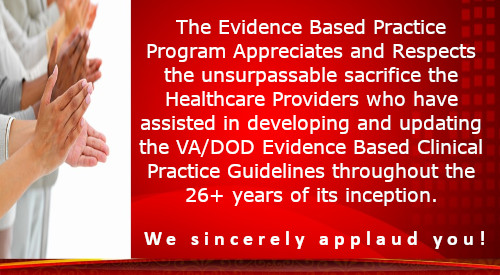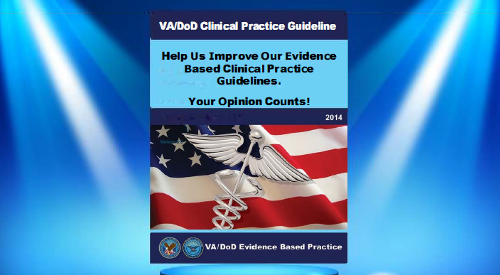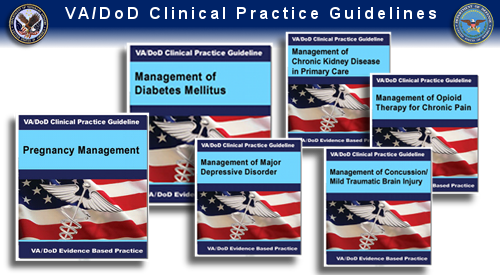VHA, in collaborations with the Department of Defense (DOD) and other leading professional organizations, has been developing clinical practice guidelines since the early 1990s. In 2010 the Institute of Medicine identified VA/DOD as leaders in clinical practice guideline development.
Implementation of evidence-based clinical practice guidelines is one strategy VHA has embraced to improve care by reducing variation in practice and systematizing “best practices”. Guidelines address patient cohorts, serve to reduce errors, and provide consistent quality of care and utilization of resources throughout and between the VA and DOD health care systems. Guidelines are also cornerstones for accountability and facilitate learning and the conduct of research. The guidelines on this site are those endorsed by the VA/DOD Evidence Based Practice Work Group.
Here is a link to our Department of Defense (DOD) colleagues website: Defense Health Agency (DHA) Clinical Quality Improvement Program.
Guidelines
What's New!
CPG Resources
 Guidelines
Guidelines
Clinical practice guidelines are used in health care to improve patient care as a potential solution to reduce inappropriate variations in care. Guidelines should be evidence based, incorporate patient input, as well as explicit criteria to ensure internal validity.
The use of guidelines must always be in the context of a health care provider's clinical judgment in the care of a particular patient. For this reason, the guidelines may be viewed as an educational tool to provide information in shared decision making.
Watch 'An Introduction to VA/DOD Clinical Practice Guidelines' | Microsoft Stream
Retired CPG's can be found on our archive page
 What's New!
What's New!
New and Newly Updated Evidence Based Clinical Practice Guidelines (CPG) and Associated Tools
- The Primary Care Management of Chronic Kidney Disease (2025)
- The Primary Care Management of Asthma (2025)
- The Management of Chronic Insomnia Disorder and Obstructive Sleep Apnea (Insomnia/OSA) (2025)
- Rehabilitation of Lower Limb Amputation (2025)
The VA and Department of Defense (DOD) have collaboratively developed evidence-based clinical practice guidelines since the 1990s.
The CPGs provide information that is evidence-based and unbiased by conflict of interest. They are based on the best available evidence at the date of publication, and are intended to provide a general guide to best practices.
These guidelines can assist healthcare providers, but the use of a CPG must always be considered as a recommendation, within the context of a provider’s clinical judgment, for the care of an individual patient.
Listed below are the Updated CPG links:
- The Primary Care Management of Chronic Kidney Disease (CKD)
- The Primary Care Management of Asthma (2025)
- The Management of Chronic Insomnia Disorder and Obstructive Sleep Apnea (Insomnia/OSA) (2025)
- Rehabilitation of Lower Limb Amputation (2025)
VA/DOD CPGs are recognized nationally and internationally as exemplars, and their quality speaks for itself. The Director of the Evidence-Based Practice Program, Dr. James Sall, recognizes that the tremendous dedication, time, expertise, and energy of the work group members are entirely responsible for the quality reputation of our CPGs. He sincerely thanks the Champions and Work Group members for providing our health care teams with the tools for providing Veterans optimal evidence-based care.
 CPG Resources
CPG Resources
- Epocrates (Online Guidelines)
- Evidence-Based Synthesis Program
- Guide to US Preventive Service Task Force
- Pharmacy Benefits Management (VA)
- VHA Preventive Health
The following sites provide additional information on evidence-based clinical practice:
- QUERI - VA/HSR&D Quality Enhancement Research Initiative - which works to improve the quality of health care for veterans by implementing research findings into routine practice
- ECRI Guideline Trust* is a public resource for disseminating evidence-based clinical practice guidelines
- MyHealthE Vet is the VA on-line personal health record that allows veterans to access their own health information as well as a wealth of patient education materials
- Defense Health Agency Medical Affairs/Clinical Support Division* is the world-wide contact point for clinical guidelines used by all branches of the service
* Links will take you outside the VA/DOD CPG web site. VA does not endorse and is not responsible for content on the linked sites.
























